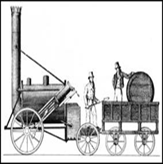| People in the United States in the nineteenth century were (21) by the (22) that unprecedented change in the nation’s economy would bring social (23) . In the years following 1820, after several decades of relative stability, the economy (24) a period of (25) and extremely rapid growth that continued to the end of the nineteenth century. (26) that growth was a structural change that (27) by increasing economic diversification and a gradual shift in the nation’s labor force from agriculture to manufacturing and other nonagricultural pursuits. Although the birth rate continued to decline from its high level of the eighteenth and early nineteenth centuries, the population roughly doubled every generation during the rest of the nineteenth century. As the population grew, its (28) also changed. Massive waves of immigration brought new ethnic groups into the country. Geographic and social mobility--downward as well as upward-- (29) almost everyone. Local studies (30) that nearly three-quarters of the population in the North and South, the emerging cities of the Northeast, and in the restless rural counties of the West changed their residence each decade. As a (31) , historian David Donald has written, "Social atomization affected every segment of society", and it seemed to many people that "all the recognized values of orderly civilization were gradually being eroded." Rapid industrialization and increased geographic mobility in the nineteenth century had special (32) for women because these changes tended to (33) social distinctions. As the roles men and women played in society became more rigidly defined, so did the roles they played in the home. In the (34) of extreme competitiveness and dizzying social change, the (35) lost many of its earlier functions and the home came to serve as a (36) of tranquillity and order. As the size of families decreased, the roles of husband and wife became more clearly (37) than ever before. In the middle class especially, men participated in the productive economy while women (38) the home and served as the custodians of civility and culture. The intimacy of marriage that was (39) in earlier periods was rent, and a gulf that at times seemed unbridgeable was (40) between husbands and wives. |
A.haunted
B.frequented
C.obsessed
D.tormented
参考答案:A
解析: 此处意为“被……所困扰,烦扰”,其他选项均不太切合此意。



